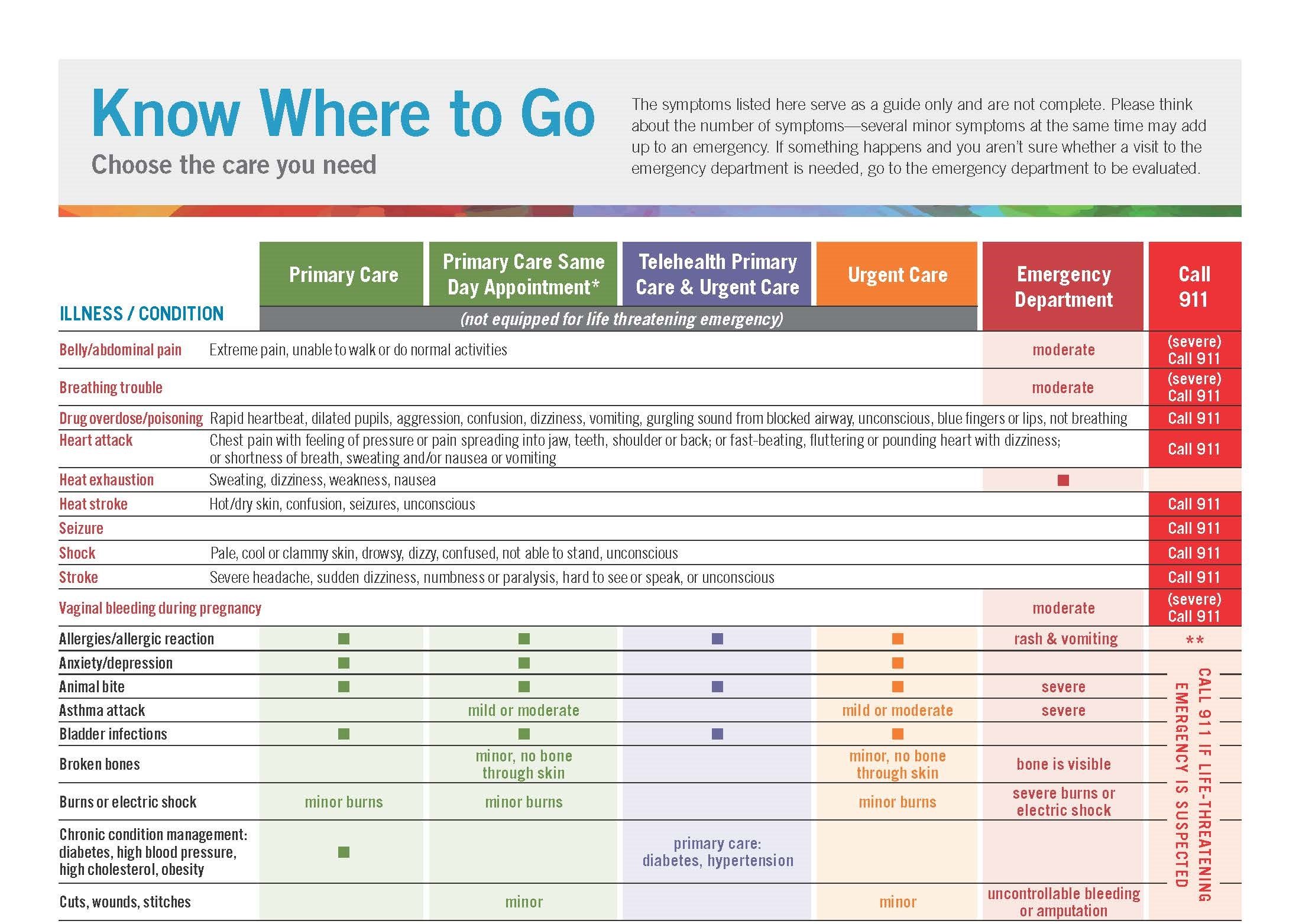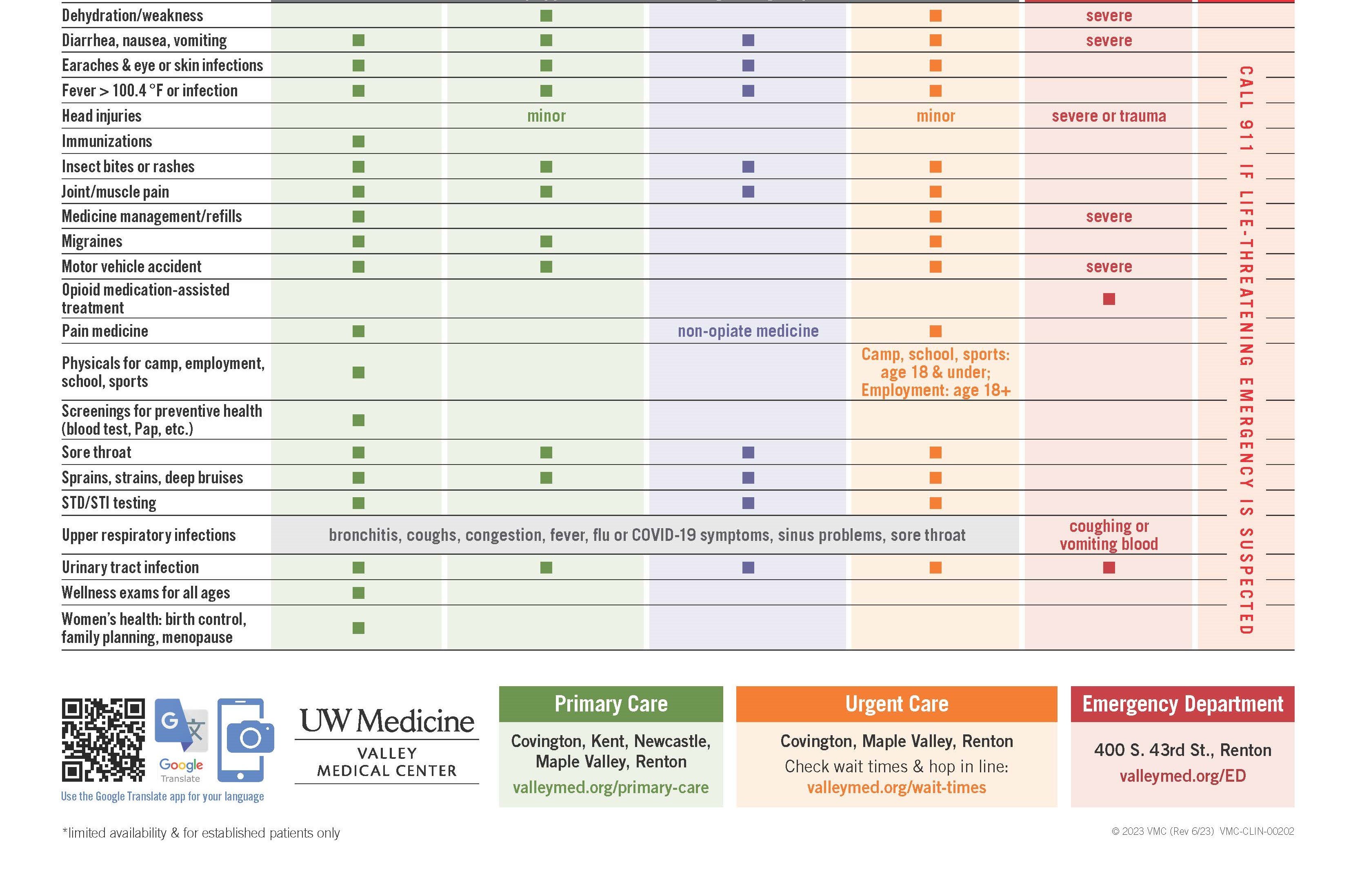UW Medicine’s contracts with Aetna for Medicare Advantage and Commercial services expire on May 31, 2025, unless renewed. We have not been able to reach a fair agreement with Aetna that is financially feasible. If an agreement cannot be reached, we will be out of network with Aetna, effective June 1, 2025. Learn more.
When Your Body is Telling You Something, We're Here to Help
A consistent ache, or a new extra painful ache. Numbness, nausea, dizziness or something else that just makes you feel…off. No one knows your body better than you do, so when your body is telling you something, it is important to listen and to seek care.
Whether a one-time issue or a chronic condition, Valley’s staff and providers are here to help you figure out what your body is telling you and to get you the care you need.
Types of Care
First things first--you need care, but there are SO MANY provider and clinic options at Valley, it can be difficult to figure out where to begin. Here is an overview of the different types of care offered:
Primary care usually the first point of contact for your healthcare needs. Primary care clinics are the "home base" for your medical care.
Primary care clinics are staffed by primary care providers (PCP). A PCP can be a physician, nurse practitioner, or physician assistant who usually specializes in family medicine, internal medicine, or pediatrics. They take care of routine check-ups, preventive care, and general health concerns. PCPs help manage chronic conditions, provide vaccinations, and offer advice on healthy living. If you have a medical issue that requires specialized care, they may refer you to a specialist.
Urgent care clinics are facilities that provide immediate medical attention for non-life-threatening conditions, when you can't see your PCP right away. They offer extended hours and can treat common illnesses like cold or flu, infections, and minor injuries. Urgent care clinics have healthcare professionals who can perform X-rays, stitches, and basic lab tests. It's important to note that urgent care is different from emergency care, which is for life-threatening situations.
The emergency department at hospitals is designed for severe and life-threatening situations that require immediate attention. Emergency medicine providers are trained to handle critical conditions like heart attacks, severe injuries, or sudden illnesses. They have access to advanced equipment, such as imaging machines and surgical facilities, to diagnose and treat emergency cases promptly.
If you have a true medical emergency, such as severe chest pain or difficulty breathing, you should call 911 or go directly to the nearest emergency department.
If you have a specific health problem that needs specialized care or a procedure, your PCP may refer you to a specialty care provider. A specialty care provider is a healthcare clinician who focuses on a specific area of medicine. They have extra training and expertise in a particular field. Examples of specialty care providers include cardiologists (heart doctors), dermatologists (skin doctors), and neurologists (brain and nerve doctors). Valley has more than 30 specialty care areas, with clinics throughout South King County.
Telehealth is a video visit with a provider for routine, non-emergency appointments. Telehealth is offered in primary care, specialty care, and urgent care clinics. Learn more about telehealth.
Choose the Care You Need
You're listening to your body and know you need to see a provider--but where do you go? The guide below can help you decide whether to go to your PCP, urgent care or the emergency department, and if telehealth is an option for your symptoms. It is important to note that the symptoms listed here are to serve as a guide only and are not complete.
Please think about the number of symptoms--several minor symptoms at the same time may add up to an emergency. If something happens and you aren't sure whether a visit to the emergency department is needed, go to the emergency department to be evaluated.
DocTalk Videos
Learn more about different types of care from Valley providers.
In this video, Kawai Kaneali'i, RN and Valerie Mazziotti PA-C run through a mock Primary Care visit and answer common questions our primary care providers receive from patients, including:
04:13 | Why did I have to come in for an appointment? Why couldn't I just send a MyChart message?
06:08 | If I see a specialist regularly, why do I also need to see a Primary Care Provider?
08:21 | What can I do to improve my sleep?
13:03 | If I've been feeling sad and anxious, should I talk to my PCP or a therapist?
15:06 | What are the specific health risks associated with being overweight? 23:38 | Can smoking cause other diseases outside of lung cancer?
26:19 | Marijuana is legal now, does that mean it's safe?
27:44 | At what age do I need a mammogram?
29:22 | Do I need screening for ovarian cancer?
32:13 | When should I start colon cancer screening?
36:30 | Why is Chlamydia screening recommended at age 16?
38:02 | Why is a Pap not recommended until age 21, when it used to be age 16?
40:39 | When do men need screening for prostate cancer?
0:21: What are the care differences between urgent care and the emergency department?
1:33: When should a patient schedule with their primary care provider rather than going to an urgent care clinic?
3:11: Valley is now offering video visits or telehealth appointments for urgent. What types of conditions are ideal for this type of care?
4:43: What are the current guidelines for seeking care when someone has an upper respiratory infection (that could be a cold, the flu, or even COVID)?
6:03: What can you tell us about high standards and patient-centered care at Valley's urgent care clinics?
Join Todd Curtis, MD, from Valley’s Covington Primary Care Clinic and Allison Warmington, PA-C from Valley’s General & Surgical Specialists Clinic as they answer the what’s, why’s, and how’s of a telehealth visit.




